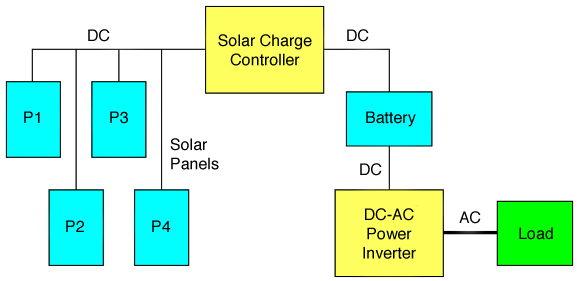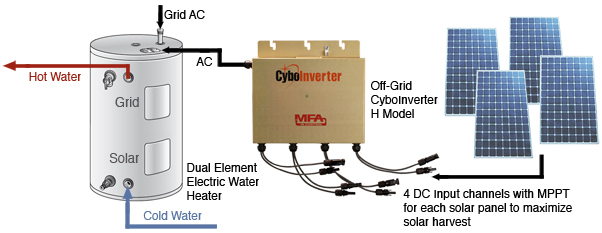|
|
|
|
|
| |
Off-Grid Inverter |
|
| |
|
|
| |
Although energy storage based microgrids are attracting a lot of attention and investment, there's a niche for battery-less microgrids. CyboEnergy offers off-grid CyboInverters that can be used with or without batteries. As there are many off-grid solar applications where batteries aren't actually needed, battery-less microgrids are a possibility not previously offered in the industry.
In traditional off-grid solar systems, batteries are a necessity. However, batteries have ongoing maintenance requirements, and can be heavy and costly. As a better alternative, battery-less microgrids offer real-world solutions that are efficient and cost-effective, especially for PV solar heating and solar cooking.
Traditional Off-Grid Solar Systems
Traditional off-grid solar power systems are designed based on the use of batteries. As shown in Figure 1, a traditional off-grid DC-to-AC inverter has to take DC power from the batteries. Solar panels are just used to charge batteries. Batteries are heavy, expensive, need maintenance, and do not last long. Lithium-Ion batteries are lighter in weight but cost several times more than Lead-Acid types. Since rechargeable batteries can only be charged a number of times, this design has a fundamental weakness causing a shorter battery life.

Figure 1. Traditional Off-Grid Solar Power System
A Better Approach with Off-Grid CyboInverters
Figure 2 illustrates an off-grid CyboInverter that directly obtains DC power from solar panels, while generating AC power for the loads. In this system, the off-grid CyboInverter has four DC-input channels, which connect to four solar panels using MC-4 connectors. Each input channel has its own MPPT for each solar panel, so the solar energy harvest is maximized.

Figure 2. Off-Grid Solar System Without Batteries
As an example of a battery-less microgrid application, a dual-element electric water heater can be re-wired to connect its lower heating element to the inverter AC output, leaving the upper heating element connected to the grid. To save electricity, the thermostat of the lower heating element would be set higher than the upper thermostat. This way, the grid power does not turn on unless a lot of hot water is used during a short period of time.
Critical Merits of Off-Grid CyboInverter Approach
We now present the critical merits of our approach and solution compared with traditional off-grid solar power systems. There are at least 6 compelling reasons to use CyboInverters for your off-grid solar power systems as listed below:
|
|
| |
|
|
| |
| Key Points |
Traditional Off-Grid Systems |
CyboInverter Based Off-Grid System |
| Battery Life |
The inverter takes DC power from the battery even if it is a sunny day. This means, the battery is always at work. |
CyboInverter can take DC power from solar panels and power the AC load directly. The battery is idle if the solar panels can provide sufficient DC power to allow the CyboInverter to run the connected AC loads. This way, the battery will last much longer. |
| Safety, Arc, and Fire Hazard |
Multiple solar panels need to be combined in series and/or in parallel to provide a high voltage and high current DC source to the solar charge controller. High voltage DC can arc and cause fire. High current DC is dangerous. |
Each solar panel is connected to an input channel of the CyboInverter so that the off-grid system has only low voltage and low current DC. It is intrinsically safe. |
| Flexibility |
No flexibility. Battery is the key component. The inverters will not work without the battery. |
CyboInverter has 4 input channels and can take DC power from solar panels and/or batteries with a flexible configuration. So, the system can be battery-less or battery enabled. |
| Upfront and Maintenance Cost |
Quality lead-acid AGM batteries cost about $4 to $5 per Amp Hour. So, 3 x 12V 50AH battery can cost 3 x $250 = $750. 3 x 12V 100AH battery can cost $1,500.
Lithium Ion type batteries can cost several times more. A 48V, 100AH Lithium Ion battery can easily cost $5000 or more.
Although the inverter may be affordable, the batteries that are required in the system is the killer for the budget. What is worse, batteries may last only a few years. They need to be replaced. So, the maintenance cost will be high. |
The CyboInverter based off-grid solar power system costs much less just by using fewer batteries.
In addition, there are many off-grid solar applications where batteries are not needed such as:
electric water heaters,
electric air heaters,
electric cooking ovens, and
home appliances, etc.
In these cases, if grid power is available to power the loads at night, batteries are not needed resulting in big savings in both upfront and maintenance costs. |
| MPPT and Solar Energy Harvest |
Solar charge controllers claim that they have MPPT. When putting multiple solar panels together in series and/or parallel, the I-V (Current and Voltage) curve of the DC source will most likely have no single MPP (Maximum Power Point). Thus, the claimed Maximum Power Point Tracking (MPPT) in solar charge controllers can get stuck in a "local maximum power point" and unable to harvest the available solar energy. |
A 4-channel CyboInverter can connect to 4 solar panels. Each CyboInverter’s input channel has its own control and maximum power point tracking (MPPT) mechanism so that solar power harvest is maximized. In this regard, lower volume batteries and a smaller battery charger can be used to provide adequate performance for the application. |
| Partial Shading and Power Production |
The performance of the solar charge controller is dictated by the performance of the weakest solar panel. When there is partial shading due to clouds, trees, dust on the panel, etc., the battery charging operation may not work well. For this reason, higher volume batteries and larger charge controllers need to be designed into the system. |
Because CyboInverters has MPPT for each solar panel, the partial shading problem is eliminated. In other words, one partially shaded panel will not affect the performance of other panels. This is an important feature that allows the off-grid CyboInverter to deliver AC power to the load reliably and smoothly. |
|
|
| |
|
|
| |
For more info and discussion, please download Dr. George S. Cheng’s article published in North American Clean Energy magazine, entitled "A Solar Power Microgrid With or Without Batteries," here. |
|
| |
|
|
| |
|
|
| |
|
|
|

